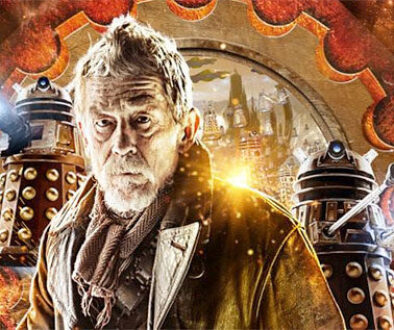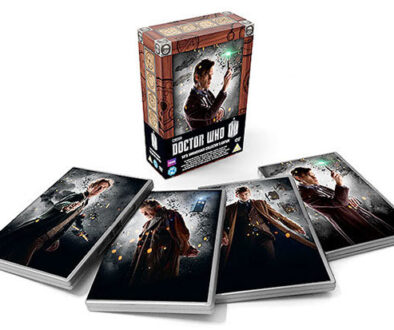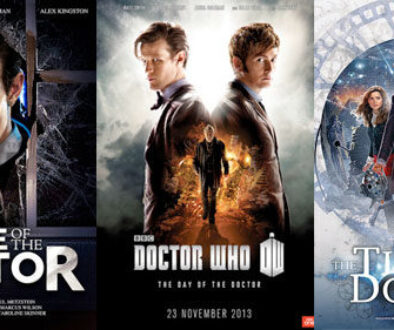George Mann on Writing the War Doctor
Patrick Kavanagh-Sproull interviews the author of Engines of War.

Thank the heavens for Engines of War. And for George Mann, too, because without him, the new masterpiece from BBC Books would have never been made (because in less skilled hands it could have flopped massively but Mann tackled the commission deftly). The writer (Paradox Lost, Tales of Trenzalore: An Apple A Day) was tasked with delivering a full-length novel that preceded The Day of the Doctor, chronicling the later years of the War Doctor’s life,and he delivered a piece of extremely rich and satisfying prose.
This interview was late coming purely because the success of Engines of War overwhelmed Mann – and rightly so, he deserves every ounce of praise. If you currently don’t have a copy of it then I implore you to acquire one as soon as possible – it’s a real accomplishment.
I had the chance to fire a few questions at Mann about researching the Time War, nailing John Hurt’s mannerisms and the possibility of returning.
It’s a considerable remit to be given –to be the person to write an adventure set during the Time War –so what was it like when you first sat down to write Engines of War?
Exciting, daunting, a little terrifying. To be honest, I found I couldn’t really dwell on what I was doing – writing the first solo adventure of the War Doctor, fighting the Daleks during the Time War, which has to be every fan’s dream gig – because otherwise I started overthinking it. It helped that I was working on a deadline, which meant that I couldn’t afford to stall. I just had to roll my sleeves up and get stuck in.
That said, every now and then, lying in bed at night, there was a certain little frisson when I considered how lucky I was. In fact, there still is!
Probably a dull question here but when I found out there was a War Doctor novel coming out, I was genuinely surprised. It’s quite a quick turnaround after The Day of the Doctor so when were you approached (and if you factor in your excellent instalment in the Tales of Trenzalore anthology, you were clearly quite a busy bee for the first half of this year)? And what was your reaction to being asked?
It was after the Tales of Trenzalore story that Justin approached me about writing the book, so yes, I was a VERY busy man for a while. But no matter how busy you are, how little sleep it will mean, you don’t turn down an opportunity like that. So I made it work. And I didn’t sleep, I can assure you. Especially that first night.
My reaction to being asked? I think I swore a lot. As in, Malcolm Tucker amounts of swearing. Then I actually got up and did a silly little dance behind my desk, caught my breath, and rushed off to tell my ten year-old son (who then had to be sworn to absolute secrecy!).
Did you ever consider including a character that has already appeared in the show and using them as the companion (i.e. Romana, Susan)?
I considered it, of course. But I think there was a risk I could have overdone it. I mean, we’re all hoping this isn’t going to be the only Time War story, aren’t we? And those characters like Leela, Romana etc, they deserve breathing space, proper stories of their own. This book was always going to be the War Doctor’s story. It had to be – it’s the first one. And then there were the Daleks and the Time Lords to consider. I think revisiting old companions would have done two things – thrown away their stories as footnotes, and overloaded the book with continuity. I’m very fond of those characters and I’d love to write for them all one day, but I wanted to get the balance right.
How did the character of Cinder come about, then?
Well, the Doctor isn’t the Doctor without a companion, and as I said a moment ago, this was always going to be the War Doctor’s book. He needed a counterpoint, someone to contrast him against, and someone to see him through fresh eyes and share that experience with the reader.
I’m very fond of Cinder. She really became a person to me while I was writing the book. She starts the story in a very similar place to the Doctor – alone, drifting, fighting, unfocused – and it’s seeing this that allows the Doctor to see himself properly for the first time in years, to see what he’s become. Cinder reminds him who he is, and that’s exactly what he needs, even if he doesn’t like it.
There’s an awful lot of history with the Time War –so how much research did you do beforehand?
I watched and re-watched a lot of episodes of the show. Last of the Time Lords, The Five Doctors, The Deadly Assassin, The Parting of the Ways, The Stolen Earth – and, of course, The Day of the Doctor. As well as lots of others. I looked up what had been written about the Time War, too, in terms of reference books and articles. I wanted to make sure I didn’t contradict anything – unless I wanted to!
Having written for the Eleventh Doctor before, was there a considerable difference in writing for the War Doctor?
Absolutely, yes. He’s very much the same Doctor, of course, but he has his own mannerisms and speech patterns, and he’s at a very different point in his life. There’s a burden on his shoulders, the weight all the things he’s has to do. A bitterness, too, because he’s had to sacrifice himself in the process, and it still hasn’t changed anything. He’s made a difference, of course, but he hasn’t been able to stop the war, and now he’s getting exasperated.
Just as I did when I was writing for Matt Smith’s Eleventh Doctor, I watched John Hurt’s performance over and over, until his voice was in my head, and I could hear him saying the lines in the book. I think with a character like this it’s really important that you try your best to capture the actor’s performance on the page, to make the character feel authentic.
I found that, in Engines of War, you have a very specific window to slot the entire novel into. You’ve got a smattering of familiar faces appearing in the book and you could compare it to a game of Operation in that you have to be very careful not to touch the sides –i.e. affect these familiar faces’ character arcs. Did you have to be very deliberate when writing?
[Note: The following answer contains a spoiler about a returning character. If you haven’t read the story it is recommended you skip ahead]
Oh, absolutely. Again, I wanted to be very true to the characters, but at the same time I wanted to tell a meaningful story. I didn’t want to put everything back in the toy box at the end. It has to mean something, otherwise it’s not worth telling the story in the first place. What happens to Borusa, for example – it’s a story of redemption, and it changes our perspective of him irrevocably.
One of the most satisfying things about the whole experience has been the amount of people who’ve told me they read the book and then went back to watch The Day of the Doctor, and that the experience of reading the book had enriched the viewing experience for them, because they now have a deeper understanding of why the War Doctor is making the decisions he is, and the emotional journey he’s coming to that episode off the back of.
I think that after most people have put down Engines of War, they’ll be screaming for the rooftops for more Doctor Who material from you. So, what are your hopes regarding your future on Doctor Who?
Well, I’d love to write more. I’m bursting with enthusiasm for Doctor Who. It’s a part of my psyche, and has been since I was a kid. I’ll always make time for it, and if Engines of War proves popular, I’d love to follow it up with another book. Of course, if Mr. Moffat is reading, he only has to ask…I’d give my eye-teeth to write an episode of the show!
George Mann, thank you very much.








